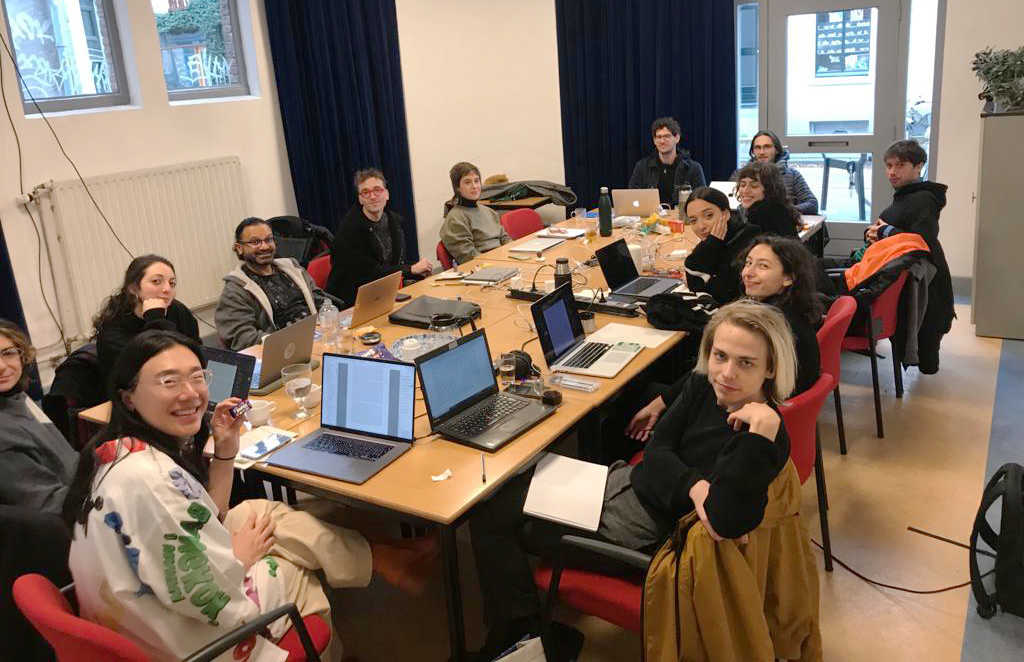For a Revolutionary Becoming of Attention: Perception, Movement, Technics Within and Against the Postcolony ~ From Month to Month
The seminar is tutored by: Dr. Amit S. Rai
Participants second year: David Přílučík, Max*ine Vajt, Iliada Charalampous
Participants first year: Astrée Duval, Celeste Perret, Cristina Ramos, Dalia Maini, Federica Nicastro, Francesca Pionati, Noam Son, Savva Dudin, Tomer Fruchter
Seminar 2 (January + February 2023) Online
We began with two quotes from Glimore's Abolition Geographies, and discussed following topics: Crisis and Attention (Gilmore); Mindfulness, Breathing, Movement politics (brown, Gumbs); Patriarchy, Time, history (Freeman); Normative timing is disaggregated and denaturalized (Freeman); Time, temporality, and attention (Deleuze, Freeman); Movements of Racial Capital (Gilmore); Anti-state state (Gilmore); Prison-industrial (financial) complex (Gilmore); Surplus populations (Marx, Davis, Gilmore); How to build stronger movements: Organise, organise, organise! (Gilmore, brown); The condition and ends of the Masters Tools (Lorde, Gilmore); What is oppositional work? (Gilmore); Gramsci’s passive revolution (Gilmore); The stretch of attention (Ingold, Gilmore, Freeman); Attending to social movements, writing their histories otherwise (Gilmore); Attention to Intersectionality (brown, Gilmore); Habitus as an incarnation of class (Freeman, brown, Gilmore); Temporal noncoincidence between action and result (Freeman); Dialectical method: competition between temporalities. (Freeman); The contract and attention (Deleuze)
Ruth Wilson Gilmore, Abolition Geography: Essays Towards Liberation:
"The world is, as everybody in this room knows, in political, economic, military, environmental, and ideological crisis. Recent scholarship in American studies strives to decenter the United States while remaining meticulously mindful of its forceful, although by no means decisive, role in globalization—as a source of capital and capital organization, as a market for goods, and as a muscular purveyor of culture. Wealth inequality in the United States is at record levels. The bottom 40 percent of earners have negative net worth while the top 20 percent own 84 percent of everything there is to own. We’re not talking about houses: we’re talking about everything there is to own. The broad measure of US unemployment at this writing [in 2011] hovers at just under one in five workers, and long-term unemployment is off the charts … There’s a blip in the early years of the Reagan introduction of deep structural adjustment programs in the United States, and then we see what has happened since the meltdown in 2008. At the same time, one in a hundred US adults is locked in prison or jail. In addition, about 4 million or so people are under direct control of the system, although not locked up, so that gets us to almost 7 million people in that general category of excluded worker." p. 31
The movement of capital, in other words, both precedes and confirms structural adjustments, but the latter must be guaranteed, as it were, by some combination of coercion and consent. The rise in security work, therefore, is the natural outcome of the renovation and deepening of uneven development throughout the world. The anti-state state. This novel form is normative in the United States today and is touted abroad, but with uneven results. The anti-state state is the one that candidates run against in order to get state power. Variations of the anti-state state exist outside the United States, but by no means are all sovereign state forms in this era enlivened as anti-state. At the same time, across the spectrum globally, on average, governmental spending in real dollars has climbed, meaning that even though there’s global pressure for structural adjustment to be enacted as shrunken states, what’s actually happened is a downward relocation of the social wage across the subpolities of a territorial unit, along with bigger expenditures on the military, in addition to rising fractions of state budgets on prisons, policing, and other guard duty while schools, hospitals, arts, and leisure go begging. To date about $780 billion have been spent on the wars in Iraq and Afghanistan. p. 32
Reading:
brown, maree adrienne. Holding Change. Chico, CA: AK Black, 2021.
Freeman, Elizabeth. Time Binds: Queer Temporalities, Queer Histories. Durham: Duke University Press, 2010. Introduction and Chapter 4.
Gilmore, Ruth Wilson. Abolition Geography: Essays Towards Liberation. London: Verso Books, 2022. Sections 1 and 4.
Ash, J. “Technology, Technicity, and Emerging Practices of Temporal Sensitivity in Videogames.” Environment and Planning A 44, nr. 1 (2012): 187–203.
Lotti, L. “The Art of Tokenization: Blockchain Affordances and the Invention of Future Milieus.” Media Theory 3, nr. 1 (2019): 287–320.
Benjamin, R. Race After Technology: Abolitionist Tools for the New Jim Code. London: Polity Press, 2020. “Introduction.”
Seminar 1 (November 2022) in Arnhem
Information to be added.


